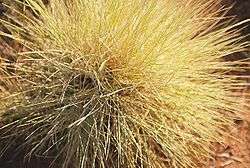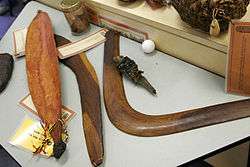Spinifex resin
Spinifex resin is a gum coating of some species of spinifex grasses. The resin was traditionally used in tool making by Aboriginal Australians. Many species of spinifex are extremely resinous, to the extent that resin may drip down the stems and leaves on hot days, and large residual lumps of resin often may be seen at the bases of hummocks which have burned.[1]


Making the gum
The spinifex is threshed until the resin particles fall free. These particles are heated until they fuse together to form a moldable black tar which is worked while warm. When set, this gum is quite strong.
Uses
In areas where appropriate spinifex species grew, many hunting and working implements benefited from the use of spinifex gum or resin.
Spinifex resin was a crucial ingredient in spear-making, as the head was often fastened onto the shaft using this resin.
The traditional Aboriginal axe also made strong use of spinifex resin.

The base of the woomera has a clump of this resin attached to it.
A man would always carry at least one spear, and normally a clump of resin. In the evenings, repairs were carried out on spears and other utensils, and the resin was re-softened using the fire and some moisture.
The resin was also used as a binder when making paint with ochre.[2]
The gum was traditionally used for mending breaks in stone and wooden implements. In more modern times, in true Bush Mechanics spirit, spinifex resin can be melted to repair things like jerry cans for carrying water and fuel.[2]
References
- Spinifex Archived 2007-05-21 at the Wayback Machine
- http://www.global.greens.org.au/spinifex-4.pdf